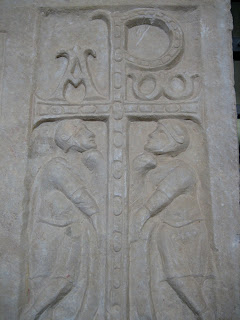My recent post on the 14 most influential religious figures in the Christian tradition has generated many suggestions and much discussion. In particular, christian a has made a provocative suggestion, that 'influence' might be merely the scars left upon the health of Christian teaching by the novelty-peddlers.:
I love this kind of activity and appreciate people's suggestions, but perhaps there's an ominous side to the "most influential" question.
History by its very nature loves to record the influential. But the easiest way I can be influential is to succeed in getting people to move away from what the last most influential figure (or an earlier unchallenged one) taught.
The coming of the Christ and the testimony of the apostles leaves so much room for Spirit-inspired Christian thinking and influence, but I reckon it leaves even more room for deficient thinking and harmful influence….and surely it’s deficient thinking and harmful influence that stands out in the pages of history and attracts the attention of church historians, rather than the faithful Christian thinkers who thought of new ways to make the same truths more coherent and more relevant to the struggles of their contemporaries.
Often we look at a list like the ones people have written and think “I admire these people” when in fact we should be thinking “I’ve ended up thinking like these people….is that good or bad?”
What do people think? Am I being too cynical ;-)
Christian makes a very good point. I never intended this to be the fourteen people you
wish were most influential, but it can quickly become so.
Part of what the exercise invites us to do is to look beyond our own local situation and struggles, to focus instead on the historical church over space and time and to ask about its shape and history - both the glorious and the shameful. Thus, the suggestions to include Arius (or mine to include Hegel and Kant - amongst others) indicate a desire to acknowledge the
problematic innovations/renovations of the tradition, in order to become conscious of them. Indeed, it has very often
been the faithful Christian thinkers who thought of new ways to make the same truths more coherent and more relevant to the struggles of their contemporaries who have, in hindsight, also exhibited
deficient thinking and harmful influence. Arius was trying to be biblical! The task, privilege, burden of handing on tradition, of gospel ministry (for the two are one), is utterly dangerous, utterly necessary.







